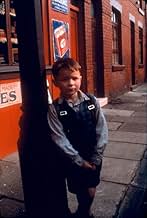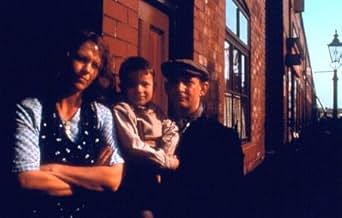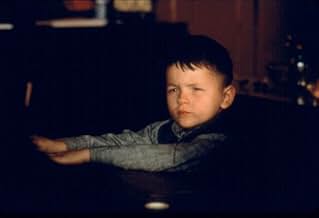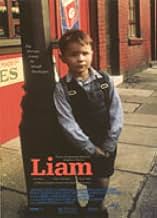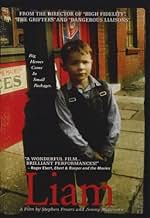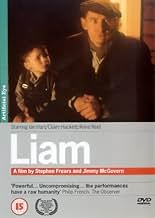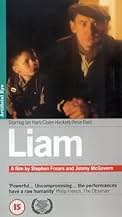PUNTUACIÓN EN IMDb
6,9/10
2,7 mil
TU PUNTUACIÓN
Añade un argumento en tu idiomaA family falls into poverty during the Depression.A family falls into poverty during the Depression.A family falls into poverty during the Depression.
- Premios
- 2 premios y 4 nominaciones en total
Sylvie Gatrill
- Nunney
- (as Sylvia Gatril)
Reseñas destacadas
10xteenzx
I thought it was a very moving film, really got the viewer involved. Showed understanding and made you feel apart. It has it's good sense of humour, seriousness and reality. The characters were brilliant,I especially enjoyed the little boy who played Liam, (Antony Burrows) and I thought the Jewish Family (The Samuel's) were very good in particular. My favourite and best part of the film, I have to say was at the end, when the daughter at the Jewish House, Jane Samuels (Gema Loveday) takes on her dramatic scene. Overall, I highly recommend 'Liam' and congratulate all those which took part, thank you.
Move a Dickens story up into the time of the Depression. Add elements of Steinbeck's "Grapes of Wrath." Add the blackshirt Fascists from "1900." Add a little boy whose father and brother are involved in desperate economic problems complete with unions and favoritism, as in "Billy Elliot."
Make it very dark, and very drear. Let the camera see drearily, smokily, darkly, unclearly.
Let the characters speak in their own, natural way, without regard to an American audience having difficulty understanding them.
This is "Liam." It is an indictment of religion, the undeniable caste system of the UK, and of government in general. It is a film that was difficult to watch, although never did I say anything like "this is bad." It was just difficult to watch.
Everything rang true, and it was heartbreaking, with a few uplifting moments...but very few. This is an excellent film, a very well-acted film, well-directed and with an excellent screenplay. But difficult to watch, in spots.
Make it very dark, and very drear. Let the camera see drearily, smokily, darkly, unclearly.
Let the characters speak in their own, natural way, without regard to an American audience having difficulty understanding them.
This is "Liam." It is an indictment of religion, the undeniable caste system of the UK, and of government in general. It is a film that was difficult to watch, although never did I say anything like "this is bad." It was just difficult to watch.
Everything rang true, and it was heartbreaking, with a few uplifting moments...but very few. This is an excellent film, a very well-acted film, well-directed and with an excellent screenplay. But difficult to watch, in spots.
this movie told a story that was hard to tell and they did it well. the last couple of years as had many up lifting and happy ending british films that have done well in the US, but LIAM breaks that and has a sad story with a sad ending that leaves us with little up for this family that has been torn this way and that way.
British filmmakers can and very often do lampoon their country's class system and its internecine struggles, amusing and entertaining us. Or they can, as in "Liam," starkly and powerfully bring to the screen a slice of 1930s, Depression-struck Liverpool and through a family show in microcosm the near self-destruction of a society (thank goodness for World War II).
England then (and now) is largely populated in working class industrial areas by Irish immigrants or their first-generation offspring. An uneasy peace between native-born working class families and Irish immigrants periodically erupts into dissension when times are bad. They were very bad in the early Thirties when a doctrine-bound Catholic church struggled to maintain a spiritual hold on dissatisfied and nearly penniless parishioners while Sir Oswald Mosely's British Union of Fascists took to the street offering a secular religion of bigotry and violence.
"Liam" is a little boy by that name who suffers from an inability to get words out when questioned or pressed but who can speak clearly in a sing-song voice when alone or at ease. He adores his older sister, Teresa, and basks in her returned love. "Dad" and "Mum" aren't given names, an effect that creates a sense of "Everyman(woman)". Dad is a proud laborer, at first suspicious of the church and latterly angry at its exactions of the small amount of money unemployed and underpaid workers have. Mom is just what you'd expect - an equally proud but pragmatic woman who strives every waking minute to manage her family. A son who leans far to the left politically is the constant irritant to dad's pride of place and certainty of values.
Dad loses his job and Teresa goes to work as a maid for the man who closed the factory where dad worked. Actually she is hired by his wife. At first unsuspectingly and then unwillingly she becomes a confidant and accomplice of the adulteress woman of the house. As we would say today, Teresa has "issues."
Meanwhile, back at the church and elementary school Liam and the children are besieged by priest and female teacher with an endless stream of horror stories about hell and exaltations to embrace doctrine unquestioningly. The strap is never out of employment for long. Not for a second do the older pair reveal the slightest comprehension of the brewing economic and social storm that the children face day in and day out.
Anti-Semitism has never been in short supply in England and in the 1930s its worst manifestations, fueled by the growing Nazi and Fascist movements, were acted out. Dad develops from a relatively benign reflexive anti-Semitism to full-fledged Jew hatred. Director Stephen Frears risked but avoided stereotyping by making his Jewish landlord, Jewish pawnbroker and affluent Jewish family hated simply because of who they were rather than by any grotesque manipulation of what they did in Liverpool. While several reviewers decry that the characters who were viewed as oppressors are all Jews, the reality is that this was one instance when both Irish Catholics and threatened by competition and unemployment English did unite against the visible and unfairly blamed Jews of Liverpool.
The cast is largely unknown here but their acting is superb. Anthony Borrows as Liam can't be overlooked. This little boy lives his complex role. I was drawn into their circle by the strength of the acting. Dad's family slides into a brush with true poverty realistically. Their pain and enveloping helplessness escapes the screen.
This film isn't anti-Catholic. It chronicles a church some few remember that did what it was trained to do, leaving for future generations the demand for reform and insight into the realities of family and community life. As obtuse as the priest and school teacher are, they probably imbued enough people with an unquestioning belief in the church to keep them immune from the blandishments of radicals on the left and fascists on the right. That's no small accomplishment.
8/10.
England then (and now) is largely populated in working class industrial areas by Irish immigrants or their first-generation offspring. An uneasy peace between native-born working class families and Irish immigrants periodically erupts into dissension when times are bad. They were very bad in the early Thirties when a doctrine-bound Catholic church struggled to maintain a spiritual hold on dissatisfied and nearly penniless parishioners while Sir Oswald Mosely's British Union of Fascists took to the street offering a secular religion of bigotry and violence.
"Liam" is a little boy by that name who suffers from an inability to get words out when questioned or pressed but who can speak clearly in a sing-song voice when alone or at ease. He adores his older sister, Teresa, and basks in her returned love. "Dad" and "Mum" aren't given names, an effect that creates a sense of "Everyman(woman)". Dad is a proud laborer, at first suspicious of the church and latterly angry at its exactions of the small amount of money unemployed and underpaid workers have. Mom is just what you'd expect - an equally proud but pragmatic woman who strives every waking minute to manage her family. A son who leans far to the left politically is the constant irritant to dad's pride of place and certainty of values.
Dad loses his job and Teresa goes to work as a maid for the man who closed the factory where dad worked. Actually she is hired by his wife. At first unsuspectingly and then unwillingly she becomes a confidant and accomplice of the adulteress woman of the house. As we would say today, Teresa has "issues."
Meanwhile, back at the church and elementary school Liam and the children are besieged by priest and female teacher with an endless stream of horror stories about hell and exaltations to embrace doctrine unquestioningly. The strap is never out of employment for long. Not for a second do the older pair reveal the slightest comprehension of the brewing economic and social storm that the children face day in and day out.
Anti-Semitism has never been in short supply in England and in the 1930s its worst manifestations, fueled by the growing Nazi and Fascist movements, were acted out. Dad develops from a relatively benign reflexive anti-Semitism to full-fledged Jew hatred. Director Stephen Frears risked but avoided stereotyping by making his Jewish landlord, Jewish pawnbroker and affluent Jewish family hated simply because of who they were rather than by any grotesque manipulation of what they did in Liverpool. While several reviewers decry that the characters who were viewed as oppressors are all Jews, the reality is that this was one instance when both Irish Catholics and threatened by competition and unemployment English did unite against the visible and unfairly blamed Jews of Liverpool.
The cast is largely unknown here but their acting is superb. Anthony Borrows as Liam can't be overlooked. This little boy lives his complex role. I was drawn into their circle by the strength of the acting. Dad's family slides into a brush with true poverty realistically. Their pain and enveloping helplessness escapes the screen.
This film isn't anti-Catholic. It chronicles a church some few remember that did what it was trained to do, leaving for future generations the demand for reform and insight into the realities of family and community life. As obtuse as the priest and school teacher are, they probably imbued enough people with an unquestioning belief in the church to keep them immune from the blandishments of radicals on the left and fascists on the right. That's no small accomplishment.
8/10.
When little Liam's father loses his job during the Depression, the family struggles to hold things together. As the world around them comes apart, we see how everyone in the family deals with the stress in their own way. Liam's dad joins the fascists, his brother attends secret meetings of the socialists, his sister goes to work as a housekeeper for a wealthy Jewish family, and Liam searches for answers in Catholicism, under the strict guidance of his haggard mum, his teacher, and the local priest.
As life becomes increasing more insecure, people begin to turn more desperately to their own belief system for answers. Religious, ideological, class and family ties all compete for primacy. We see Protestant versus Catholic, gentile versus Jew, fascist versus socialist, neighbor versus neighbor and father versus son. Unfortunately, life is not so simple as that, and each family member finds themselves torn between their loyalty to their loved ones, and their own pride and perception of righteousness. The tragic climax leaves no doubt as to the director's own perspective.
The young actor who plays Liam is perfectly cast as an innocent child forced to deal with the harsh realities of life. Although reminiscent of some recent films, this one is more raw than "Life is Beautiful" and more genuine than "Billy Elliot." This is not a movie for anyone who is merely seeking an escape, as it demands an intellectual commitment from the viewer. And while it makes some profound points beautifully, it ultimately leaves you with more questions than answers.
As life becomes increasing more insecure, people begin to turn more desperately to their own belief system for answers. Religious, ideological, class and family ties all compete for primacy. We see Protestant versus Catholic, gentile versus Jew, fascist versus socialist, neighbor versus neighbor and father versus son. Unfortunately, life is not so simple as that, and each family member finds themselves torn between their loyalty to their loved ones, and their own pride and perception of righteousness. The tragic climax leaves no doubt as to the director's own perspective.
The young actor who plays Liam is perfectly cast as an innocent child forced to deal with the harsh realities of life. Although reminiscent of some recent films, this one is more raw than "Life is Beautiful" and more genuine than "Billy Elliot." This is not a movie for anyone who is merely seeking an escape, as it demands an intellectual commitment from the viewer. And while it makes some profound points beautifully, it ultimately leaves you with more questions than answers.
¿Sabías que...?
- CuriosidadesTheatrical film debut of Anthony Borrows.
Selecciones populares
Inicia sesión para calificar y añadir a tu lista para recibir recomendaciones personalizadas
- How long is Liam?Con tecnología de Alexa
Detalles
Taquilla
- Presupuesto
- 1.600.000 GBP (estimación)
- Recaudación en Estados Unidos y Canadá
- 1.016.021 US$
- Fin de semana de estreno en EE. UU. y Canadá
- 44.399 US$
- 23 sept 2001
- Recaudación en todo el mundo
- 1.945.689 US$
- Duración1 hora 30 minutos
- Color
- Mezcla de sonido
- Relación de aspecto
- 1.85 : 1
Contribuir a esta página
Sugerir un cambio o añadir el contenido que falta

Principal laguna de datos
By what name was Liam (2000) officially released in Canada in English?
Responde

